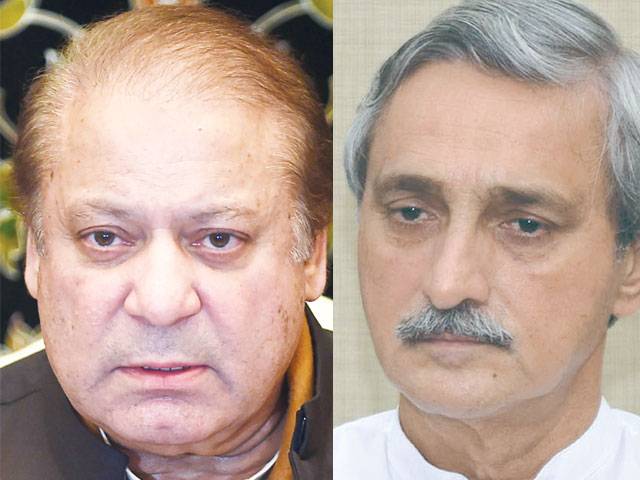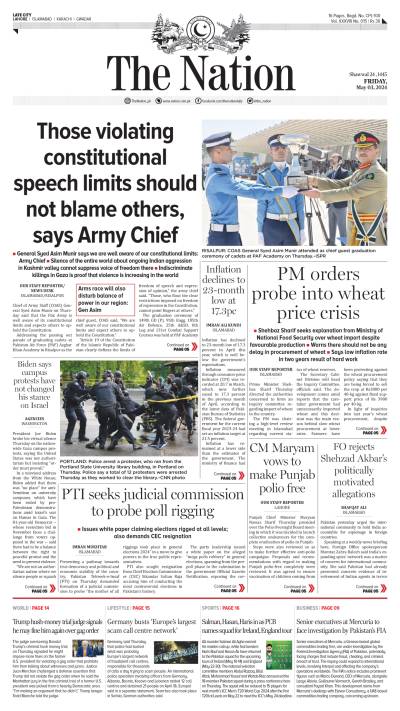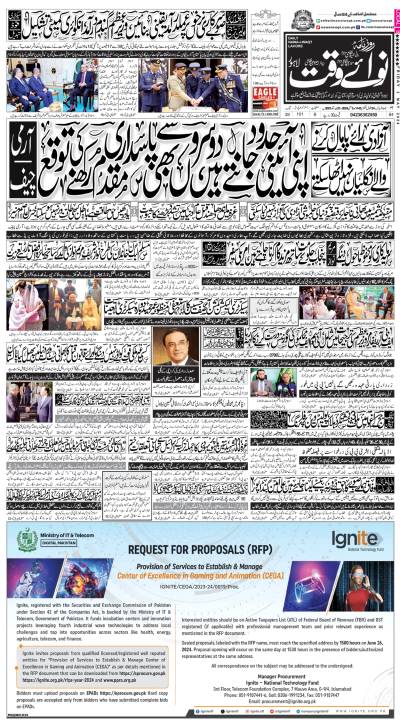ISLAMABAD - In a historic judgment that will leave a deep imprint on country’s politics and serve as a key determinant of its future course, the Supreme Court on Friday ruled that disqualification handed down under Article 62 (1)(f) of the Constitution is for whole life.
The decision – issued unanimously by all five judges of a CJP-led bench and read out by Justice Umar Ata Bandial - stated that the disqualification of any member of parliament or a public servant under this constitutional clause in the future will be “permanent”.
Article 62(1)(f) sets the precondition for a member of parliament to be "sadiq and ameen" (honest and righteous). And according to Friday’s court decision, those disqualified under this clause cannot contest elections or become a member of parliament.
A number of politicians have been disqualified under this clause, former prime minister Nawaz Sharif and Pakistan Tehreek-i-Insaf (PTI) leader Jahangir Tareen being most prominent among them.
Nawaz was disqualified by a five-judge SC bench on July 28 last year in the Panama Papers case over concealment of his UAE Iqama and court had declared him to be non-sagacious and dishonest. Tareen was disqualified on December 15 by another bench for assets concealment.
The fresh court verdict has rendered both of them ineligible to hold public office till the courts' respective declarations against them hold.
Before the verdict was announced, Chief Justice Mian Saqib Nisar remarked that the public deserves "leaders of good character".
The court observed that the conditions set by Article 62 (1)(f) on the eligibility of a candidate serve the public interest, the judicial mechanism grants an aggrieved person fair opportunity for remedy or relief, and the permanent incapacity under this clause is not against the fundamental rights.
"The restriction imposed by Article 62 (1)(f) of the Constitution for the eligibility of a candidate for election to Parliament serves the public need and public interest for honest, upright, truthful, trustworthy and prudent elected representatives," reads the verdict.
In its interpretation to determine the timeframe of disqualification, the top court observed that the judicial mechanism in the said Article grants a fair opportunity and adequate remedy for relief to an aggrieved person to vindicate himself.
The judgment stated that if the decision by a court of law has attained finality then the embargo under Article 62(1)(f) acquires permanent effect.
“The permanent incapacity of a candidate for election under Article 62(1)(f) of the Constitution [however] is not an arbitrary, excessive or unreasonable curtailment of his fundamental right under Article 17(2) of the Constitution,” the court ruled.
“We are inclined to hold that the incapacity created for failing to meet the qualifications under Article 62(1)(f) of the Constitution imposes a permanent bar which remains in effect so long as the declaratory judgment supporting the conclusion of one of the delinquent kinds of conduct under Article 62(1)(f) of the Constitution remains in effect,” the court concluded.
The unanimous verdict, which also contained an additional note of Justice Sheikh Azmat Saeed, was given in response to 19 different applications of aggrieved persons seeking interpretation of Article 62(1)(f).
The court also directed that all the appeals and petitions challenging the length of disqualification under Article 62 (1)(f) for possessing fake degrees be fixed before appropriate benches "for decision in accordance with the law laid down in this judgment, keeping in view the respective facts and circumstances of each case".
But the instant judgment closed all the doors of parliament on the supreme leader of Pakistan Muslim League-Nawaz, who was first lost premiership when he was disqualified as a parliamentarian in July last year and then he was removed as party president in February when the apex court ruled that a dishonest person cannot head a political party.
Justice Umar Ata Bandial, another member of the bench, authored a 52-page judgement on a common question as to whether the incapacity imposed by this constitutional clause upon parliament member is of perpetual effect if there is any decision against him by a court to the extent that he lacks sagacity or is dishonest.
The top court had reserved its judgment on February 14 after conducting seven hearings of the case. The judgment was announced at 11:15am on Friday in Court Room No 1, where four members of the bench sat and Justice Bandial read the judgment. The fifth member of the bench Justice Sajjad Ali Shah could not attend the bench as he was hearing some cases at the Quetta Registry of the apex court.
The judgment states that salient Islamic provisions in Article 62 were introduced in 1985 during former military dictator Ziaul Haq and the Clause (1)(f) was retained by the 18th Constitutional Amendment.
“Article 62(1)(f) of the Constitution also imposes Islamic ethical conditions for eligibility of a candidate for election to Parliament but these are made applicable to both Muslim as well as non-Muslim candidates for Parliamentary membership,” the judgment stated.
The judgment said that the criteria given in Article 62(1)(f) is derived from the Sunnah of Holy Prophet Muhammad (PBUH).
“The qualities of sagacity, righteousness, honesty and trustworthiness laid down in Article 62(1)(f) of the Constitution as qualifications for membership to the elected Houses are actually derived from the Sunnah of the Holy Prophet Muhammad (PBUH),” the judgment stated.
It added that such strengths can never be equalled by ordinary mortals for whom these are goals to strive for and more importantly not to consciously violate.
“The Holy Quran recognises the temporal significance of the character qualities specified in Article 62(1)(f) of the Constitution. These qualities are since acknowledged in political thought as attributes of a public leader.”
The verdict cited certain relevant verses of Holy Quran and a book titled “The 100, a Ranking of the Most Influential Persons in History” authored by Michael H Hart explaining the persona of Holy Prophet Muhammad (PBUH).
“These [relevant] verses are often quoted to demonstrate Allah (SWT)’s guidance that the qualities of honesty, trustworthiness, guardianship, knowledge and skill are necessary attributes of persons holding public office involving trust and responsibility,” the verdict said.
It added that these requirements are echoed in the conditions of sagacity, honesty and Ameen (trustworthiness) specified as qualifications in Article 62(1)(f) of the Constitution for membership to Parliament.
Likewise, as the expression ‘moral turpitude’ is not defined in the law so the top court relied on Words and Phrases, Permanent Edition 27-A. The judgment observed that from perusing the meaning of expression it clearly indicates that anything which is done contrary to the good principles of morality.
“According to the said definition, it is clear that offences of moral turpitude would include delinquent conduct involving, inter alia, misrepresentation, fraud, breach of trust or fiduciary duty, dishonesty, misappropriation, forgery, cheating, conflict of interest, etc.”
Difference between disqualification under Article 62(1)(f) and Article 63(1)(h)
The judgment states that the provisions of Article 62(1)(f) and Article 63(1)(h), wherein the disqualification time is stipulated for 5 years in case of conviction for an offence involving moral turpitude, are distinct.
“The two provisions of the Constitution, namely, Article 62(1)(f) and Article 63(1)(h) deal with different laws, remedies, fora, and relief although the underlying subject matter of the legal action is the same. It is settled law that the outcome of criminal proceedings for a particular misconduct cannot foreclose the outcome of civil proceedings in relation to the same act.”
The judgment further states that a convict suffers a loss by being immobilised, endures loss of his livelihood with the lasting stigma of conviction on his reputation; therefore, a convict who undergoes sentence “pays his dues to society”.
It said: “Even after his release from jail, the convict faces many daunting challenges for rehabilitating himself in society as a responsible, productive and acceptable member thereof. It is in this context that one should look at the disqualification under Article 63(1)(h) of the Constitution for a limited period of five years imposed upon a convict after his release from jail.
“An ex-convict suffers huge handicaps to find dignity and acceptance for himself in society. The notable effort by the Constitution to allow him an opportunity to reform himself and to strive for such a position in society cannot be deprecated for providing him relief rather than longer disenfranchisement.”
Differentiating Article 62(1)(f) from Article 63(1)(h), it stated that a candidate who has committed misconduct within the terms of Article 62(1)(f) and has been declared by a court of civil jurisdiction so, he is unfit to hold public office.
“[But] he cannot be compared to the case of an ex-convict under Article 63(1)(h) of the Constitution because he has not paid a personal price for his delinquent act. It is in such circumstances that a person declared to be dishonest or in breach of his trust or fiduciary duty or being non-righteous or profligate must suffer the burden of that finding of incapacity for as long as the Court decree remains in force.”
Considering that the Constitution does not fix the period of incapacitation of such a judgment debtor shows a clear intention that the lack of qualification under Article 62(1)(f) of the Constitution should extend so long as the declaration of law envisaged in Article 62(1)(f) remains in the field, it added.
“If such declaration is final and binding, then the incapacity to contest elections to any of the legislatures provided by the constitution becomes permanent.”
SC hands Nawaz lifetime ban
SYED SABEEHUL HUSSNAIN






